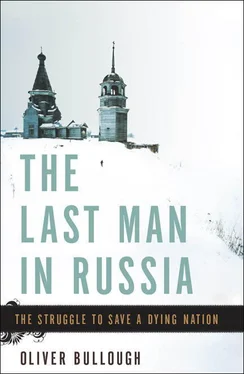Stephen Kotkin, Steeltown USSR: Soviet Society in the Gorbachev Era (Berkeley, 1991)
Stephen Kotkin, Magnetic Mountain: Stalinism as a Civilization (Berkeley, 1995)
Stephen Kotkin, Armageddon Averted: The Soviet Collapse 1970–2000 (Oxford, 2008)
Richard Lourie, Sakharov: A Biography (London, 2002)
Wolfgang Lutz, Sergei Scherbov and Andrei Volkov (eds.), Demographic Trends and Patterns in the Soviet Union before 1991 (London, 1994)
A. Malenky, Magnitogorsk: The Magnitogorsk Metallurgical Combine of the Future (Moscow, 1932)
Nick Manning and Nataliya Tikhonova (eds.), Health and Health Care in the New Russia (Aldershot, 2009)
David Marples, The Collapse of the Soviet Union, 1985–91 (Harlow, 2004)
Mervyn Matthews, Patterns of Deprivation in the Soviet Union under Brezhnev and Gorbachev (Stanford, 1989)
Catherine Merridale, Night of Stone: Death and Memory in Russia (London, 2000)
Fyodor Mochulsky, Gulag Boss (Oxford, 2011)
George Orwell, Nineteen Eighty-Four (London, 1949)
Richard Overy, Russia’s War (London, 2010)
Boris Pasternak, Dr Zhivago (London, 1959)
Donald Rayfield, Stalin and his Hangmen (London, 2004)
Keith Richards, Life (London, 2011)
T. H. Rigby (ed.), The Stalin Dictatorship: Khrushchev’s ‘Secret Speech’ and Other Documents (Sydney, 1968)
Elizabeth Roberts and Ann Shukman (eds.), Christianity for the Twentieth Century: The Life and Work of Alexander Men (London, 1996)
Abraham Rothberg, The Heirs of Stalin: Dissidence and the Soviet Regime 1953–1970 (Ithaca, NY, 1972)
Angus Roxburgh, The Strongman (London, 2012)
Joshua Rubenstein and Alexander Gribanov (eds.), The KGB File on Andrei Sakharov (London, 2005)
Theo J. Schulte, The German Army and Nazi Policies in Occupied Russia (Oxford, 1989)
John Scott, Behind the Urals: An American Worker in Russia’s City of Steel (Bloomington, Ind., 1973)
Simon Sebag Montefiore, Young Stalin (London, 2007)
Robert Service, Stalin: A Biography (London, 2004)
L. Sitko, Intalia: Stikhi i vospominaniya byshikh zaklyuchennihk Minlaga (Intalia: Poems and Remembrances of Prisoners of the Mineral Camp , Inta, 1995)
Timothy Snyder, Bloodlands (London, 2011)
Alexander Solzhenitsyn, Cancer Ward (London, 1968)
Alexander Solzhenitsyn, Arkhipelag Gulag (The Gulag Archipelago , Moscow, 1990)
Francis Spufford, Red Plenty (London, 2011)
William Taubman, Khrushchev: The Man and his Era (New York, 2003)
Olga Semyonova Tian-Shanskaia, Village Life in Late Tsarist Russia (Bloomington, Ind., 1993)
William Tompson, The Soviet Union under Brezhnev (Harlow, 2003)
Mark Trofimchuk, Akademia u Troitsy (Academy of the Trinity , Sergiev Posad, 2005)
Judyth L. Twigg (ed.), HIV/AIDS in Russia and Eurasia (Basingstoke, 2006)
Tim Tzouliadis, The Forsaken: From the Great Depression to the Gulags: Hope and Betrayal in Stalin’s Russia (London, 2008)
Anatoly Vaneyev, Dva Goda v Abezi (Two Years in Abez , Moscow, 1992)
Timothy Ware, The Orthodox Church (London, 1993)
Frank Westerman, Engineers of the Soul (London, 2010)
Stephen White, Russia Goes Dry: Alcohol, State and Society (Cambridge, 1996)
Michael Wieck, A Childhood under Stalin and Hitler: Memoirs of a ‘Certified’ Jew (London, 2003)
Venedikt Yerofeyev, Moskva–Petushki (Moscow, 1989)
Venedikt Yerofeyev, Moscow Stations (London, 1998)
These are specific references, listed by chapter, to works mentioned in the text.
INTRODUCTION: WE WILL BURY YOU
The reference to the king rejecting Islam comes from Heard’s Russian Church and Russian Dissent . The statistics on relative alcohol consumption come from Eberstadt, Russia’s Peacetime Demographic Crisis . The figures for the increase in Russia’s consumption of alcoholic drinks from 1940 to 1984 come from White, Russia Goes Dry .
The ‘we will bury you’ comment and the background to Khrushchev saying it are from Taubman’s biography of the Soviet leader.
The information on Sinyavsky and Daniel comes from On Trial , edited by Labedz and Hayward. The Alexeyeva book quoted is her excellent Soviet Dissent .
Transparency International’s corruption perceptions index is available on the organization’s website cpi.transparency.org, and the Levada Centre’s survey is on www.levada.rualong with a fascinating array of other investigations.
CHAPTER 1: THEY TOOK OUR GRANDFATHER’S LAND
The quotes from Father Dmitry are mainly taken from his Podarok ot Boga .
The eyewitness account of pre-revolutionary village life comes from Tian-Shanskaia’s Village Life in Late Tsarist Russia . Other useful books on peasant life include the early parts of Figes’s A People’s Tragedy , plus the early chapters of the following books on the famine.
These are Conquest’s The Harvest of Sorrow , Davies and Wheatcroft’s The Years of Hunger and Stalin’s Peasants by Fitzpatrick. Snyder’s Bloodlands is magnificent for collectivization, famine and the violence of the war, while Ioffe and Nefedova’s Continuity and Change in Rural Russia was also a major source.
The fate of the Jews is described in Altshuler’s Soviet Jewry on the Eve of the Holocaust and Arad’s The Holocaust in the Soviet Union . The general origins and effects of anti-Semitism are touched on in Butterworth’s The World that Never Was . Accounts of the mass rape inflicted by Soviet soldiers when they captured towns in World War Two are legion. Among them are those in Applebaum’s Iron Curtain .
CHAPTER 2: A DOUBLE-DYED ANTI-SOVIET
For details on Stalin’s deal with the Orthodox Church, see Service’s biography of the dictator, as well as the books by Jane Ellis. The quote asking where all the priests have gone is from Trofimchuk, Akademia u Troitsy , the Sergiev Posad seminary’s official history.
The details of production of food on private plots come from Ioffe and Nefedova’s Continuity and Change in Rural Russia . The quote expressing amazement about Hagia Sophia is from Heard’s The Russian Church and Russian Dissent . The details about Pavlik Morozov are from Orlando Figes’s The Whisperers . The narrative of the gulag is largely taken from Applebaum’s Gulag .
The Lenin comment is from Volume 35 of his collected works, as quoted in Andrew and Mitrokhin, The Mitrokhin Archive , which is also the source for the details on KGB penetration of the Church.
CHAPTER 3: FATHER DMITRY WAS K-956
Details on the gulag are from Applebaum’s Gulag and from Solzhenitsyn’s Gulag Archipelago .
CHAPTER 4: THE GENERATION OF CHANGE
For information on the protest against the invasion of Czechoslovakia, see Gorbanevskaya’s Red Square at Noon . The Khrushchev secret speech can be found in Rigby’s The Stalin Dictatorship . The Leonid Plyushch quotes come from Fireside’s Soviet Psychoprisons . Information on writers’ roles under Stalin can be found in Westerman’s Engineers of the Soul .
The Father Dmitry quotes here are taken from Our Hope , a collection of his sermons published in the West in English (and in Russian as O Nashem Upovanii) . A description of the debris of Father Dmitry’s first church, following its demolition, is in the introduction to Bourdeaux’s Risen Indeed .
Читать дальше












